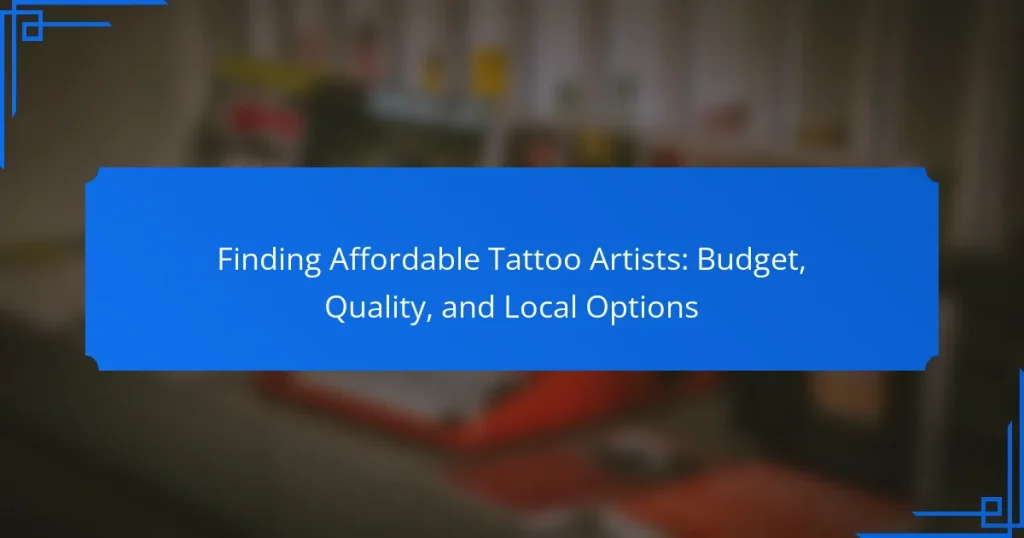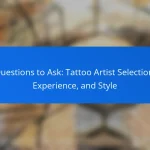Finding affordable tattoo artists requires careful research to balance quality and budget. By exploring local options and understanding the average costs, which can range from $50 to several hundred dollars, you can identify skilled artists that fit your financial needs. Evaluating an artist’s experience and the quality of their work is essential to ensure you receive a tattoo that meets your expectations.
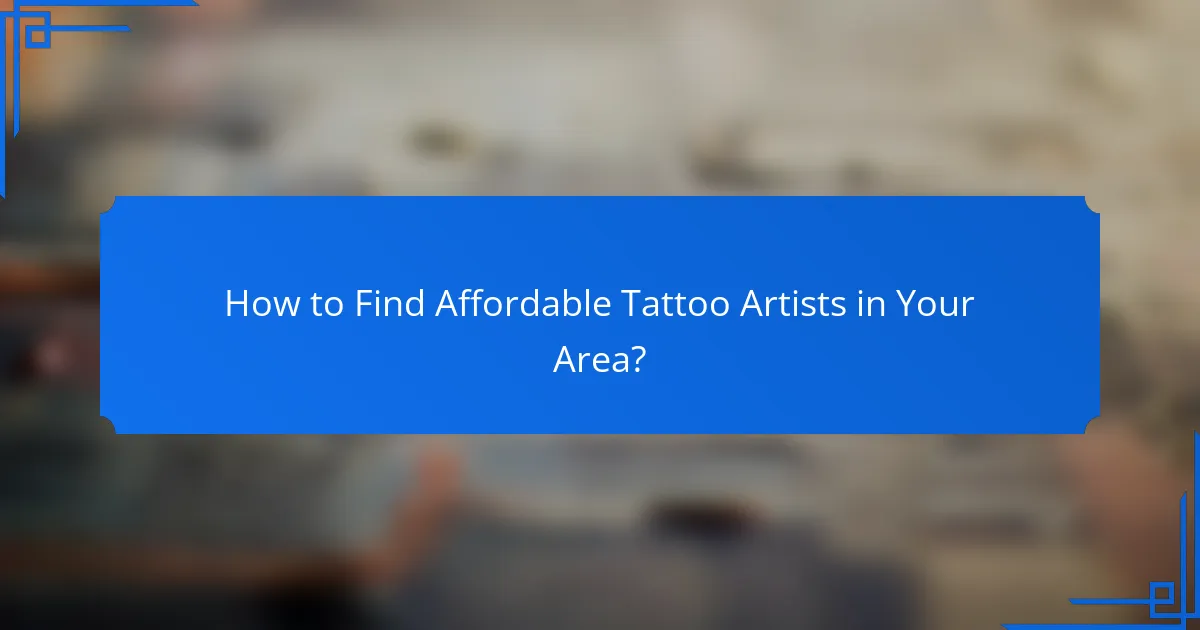
How to Find Affordable Tattoo Artists in Your Area?
Finding affordable tattoo artists involves researching local options while balancing quality and budget. Start by exploring various resources to identify skilled artists who fit your financial constraints.
Use Online Directories
Online directories like Yelp, Google Maps, and specialized tattoo sites can help you locate affordable tattoo artists in your area. Filter results based on price ranges, customer reviews, and portfolios to find artists who meet your needs.
Look for directories that allow you to compare prices and services offered. This can save time and help you narrow down your choices effectively.
Check Social Media Platforms
Social media platforms such as Instagram and Facebook are excellent for discovering affordable tattoo artists. Many artists showcase their work online, allowing you to assess their style and quality before reaching out.
Follow local tattoo hashtags or join community groups to find recommendations and special offers. Engaging with artists directly can also lead to potential discounts or promotions.
Ask for Recommendations
Word-of-mouth recommendations from friends, family, or coworkers can lead you to affordable tattoo artists. Personal experiences often provide insights into the artist’s quality and pricing.
When asking for recommendations, inquire about the artist’s professionalism, hygiene practices, and overall satisfaction with the tattoo. This can help you make an informed decision.
Visit Local Tattoo Shops
Visiting local tattoo shops allows you to meet artists in person and discuss your budget directly. Many shops offer consultations where you can ask about pricing and view portfolios.
Don’t hesitate to ask about special deals or discounts for first-time clients. Building a rapport with artists may also lead to better pricing options.
Explore Tattoo Conventions
Tattoo conventions are great venues to find affordable artists and see their work up close. Many artists offer convention-specific discounts or package deals that can save you money.
Attending these events allows you to compare different styles and techniques, making it easier to find an artist who aligns with your vision and budget.

What Is the Average Cost of Tattoos?
The average cost of tattoos varies widely based on factors like size, complexity, and the artist’s experience. Generally, you can expect to pay anywhere from $50 to several hundred dollars for a tattoo, depending on these variables.
Hourly Rates for Tattoo Artists
Hourly rates for tattoo artists typically range from $75 to $200 per hour. More experienced artists or those in high-demand areas may charge higher rates, while newer artists might offer lower prices to build their portfolios.
When considering hourly rates, it’s essential to factor in the time required for your specific design. A small, simple tattoo may take less than an hour, while larger, intricate pieces can take several hours or even multiple sessions.
Price Per Square Inch
Some tattoo artists charge based on the size of the tattoo, often calculated per square inch. Prices can range from $10 to $30 per square inch, depending on the artist’s skill level and the tattoo’s complexity.
This pricing model can be beneficial for larger tattoos, as it provides a clear framework for understanding costs. However, ensure you discuss the total estimated price with the artist before starting the tattoo.
Factors Influencing Tattoo Pricing
Several factors influence tattoo pricing, including the artist’s experience, the complexity of the design, and the location of the studio. Highly skilled artists with a strong reputation may charge more due to their expertise and demand.
Additionally, custom designs or intricate artwork will typically cost more than standard flash tattoos. Location also plays a role; studios in urban areas often have higher overhead costs, which can be reflected in their pricing.
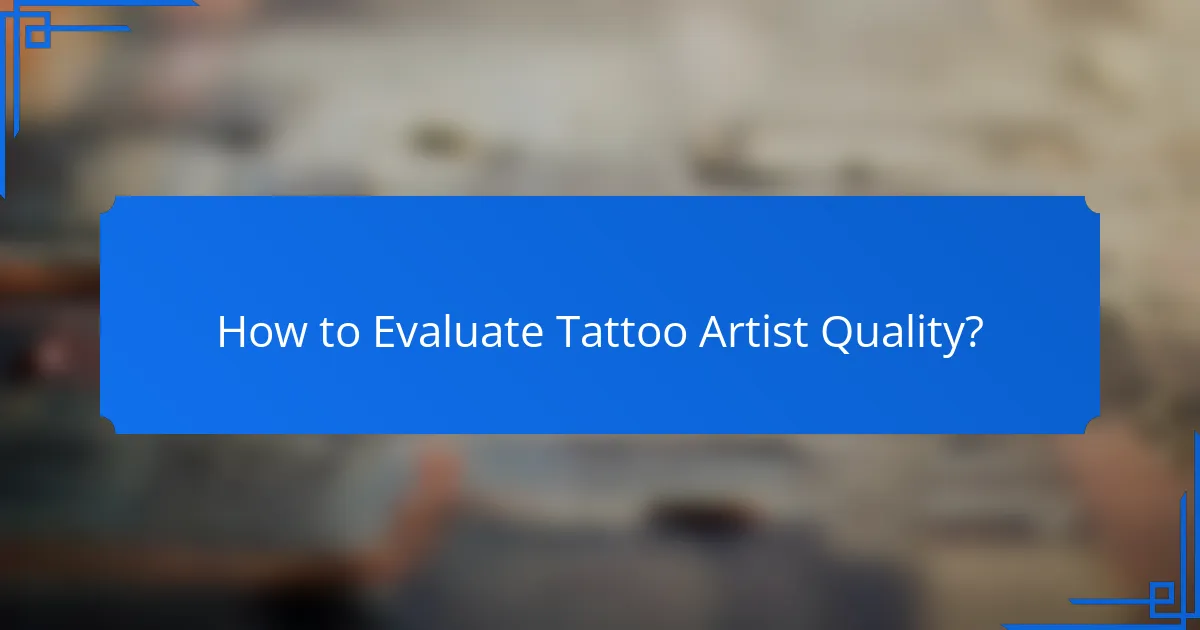
How to Evaluate Tattoo Artist Quality?
To evaluate tattoo artist quality, consider their skill level, experience, and the overall impression of their work. A good artist should consistently produce high-quality tattoos that meet your expectations and adhere to health standards.
Review Portfolios
Start by examining the artist’s portfolio, which showcases their previous work. Look for consistency in style, technique, and detail across various pieces. Pay attention to the clarity of lines, shading, and color saturation, as these elements reflect the artist’s skill.
When reviewing portfolios, consider the types of tattoos you are interested in. If you prefer realism, ensure the artist has experience in that style. A diverse portfolio can indicate versatility, but specialization might be more beneficial for specific designs.
Read Customer Testimonials
Customer testimonials provide insight into the artist’s professionalism and client satisfaction. Look for reviews on social media, tattoo forums, or the artist’s website. Positive feedback about the artist’s communication, cleanliness, and overall experience can be a good indicator of quality.
Be cautious of overly positive reviews that may seem fabricated. A mix of positive and constructive feedback is often more reliable. If possible, reach out to previous clients for firsthand accounts of their experiences.
Check Health and Safety Standards
Ensuring that a tattoo artist follows health and safety standards is crucial for your well-being. Verify that the studio is licensed and adheres to local regulations regarding sanitation and hygiene. This includes using sterilized equipment and disposable materials.
Ask the artist about their practices for maintaining a clean workspace. A reputable artist should be willing to discuss their procedures and show you their setup. This transparency is essential for your peace of mind and safety during the tattooing process.
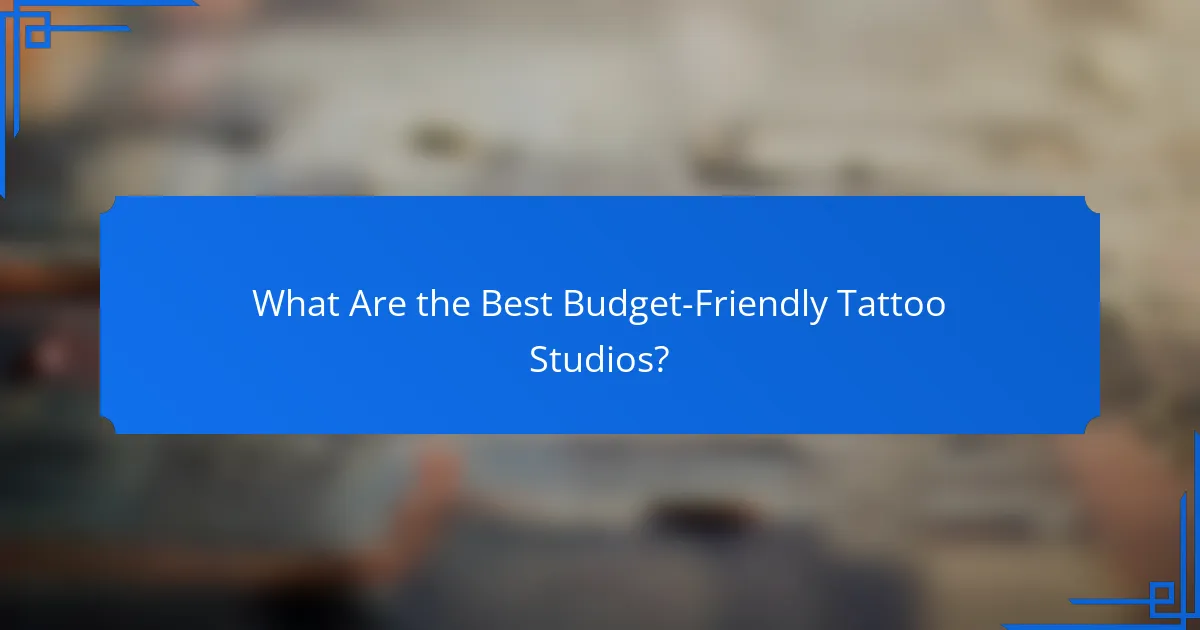
What Are the Best Budget-Friendly Tattoo Studios?
Finding budget-friendly tattoo studios involves looking for quality work at reasonable prices. Many local shops offer competitive rates without compromising on artistry, making it easier to get the tattoo you want without breaking the bank.
Local Studios with Good Reviews
Start by researching local tattoo studios that have positive reviews from previous clients. Websites like Yelp or Google Reviews can provide insights into customer satisfaction and the quality of work. Look for studios that consistently receive high ratings and have a portfolio showcasing their best pieces.
Consider visiting studios in person to get a feel for the environment and speak with artists about their styles and pricing. This can help you gauge whether the studio aligns with your expectations and budget.
Promotions and Discounts Offered
Many tattoo studios run promotions or offer discounts during certain times of the year, such as holidays or anniversaries. Keep an eye on their social media pages or websites for announcements about special deals. Some studios may offer discounts for first-time clients or referral bonuses for bringing in friends.
Additionally, inquire directly with the studio about any ongoing promotions. They may have unadvertised deals that could save you money on your tattoo.
Student Artists Offering Lower Rates
Student tattoo artists often charge lower rates as they build their portfolios and gain experience. Many tattoo schools have programs where students work under the supervision of licensed professionals, ensuring quality while keeping costs down. This can be a great way to get a unique design at a fraction of the price.
When considering a student artist, review their portfolio to assess their skill level. Make sure you feel comfortable with their work before committing to a tattoo.
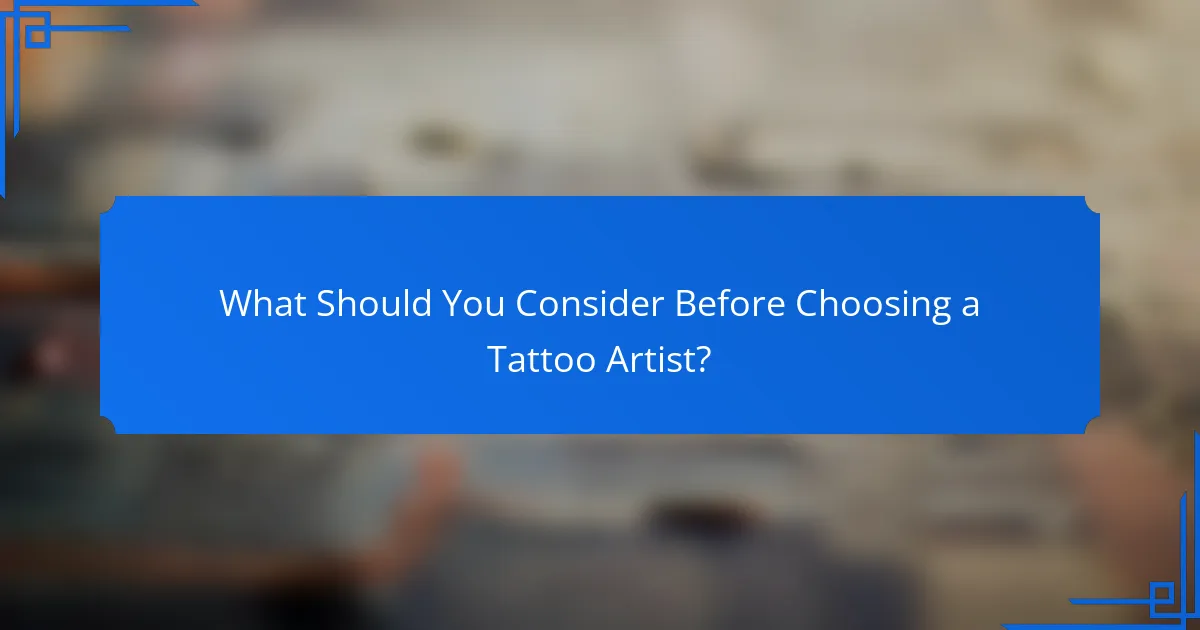
What Should You Consider Before Choosing a Tattoo Artist?
When selecting a tattoo artist, consider their specialization, the consultation process, and aftercare support. These factors will help ensure you receive quality work that meets your expectations and is safe for your skin.
Artist Specialization
Different tattoo artists have unique styles and specialties, such as realism, traditional, or abstract designs. Researching an artist’s portfolio can give you insight into their strengths and help you find someone who aligns with your vision.
For example, if you want a detailed portrait, look for an artist known for their realism. If you prefer bold colors and lines, seek out someone who specializes in traditional tattoos.
Consultation Process
A thorough consultation is essential for discussing your design ideas, budget, and any concerns you may have. During this meeting, assess the artist’s communication skills and willingness to collaborate on your design.
Ask questions about their techniques, hygiene practices, and the materials they use. A good artist will be transparent and provide you with a clear understanding of the process, including pricing, which can range widely based on complexity and location.
Aftercare Support
Aftercare is crucial for the healing of your tattoo and the longevity of its appearance. Ensure the artist provides clear aftercare instructions, which typically include keeping the tattoo clean and moisturized.
Some artists may offer follow-up consultations or check-ins to address any concerns during the healing process. This support can be invaluable, especially for first-time tattoo recipients.
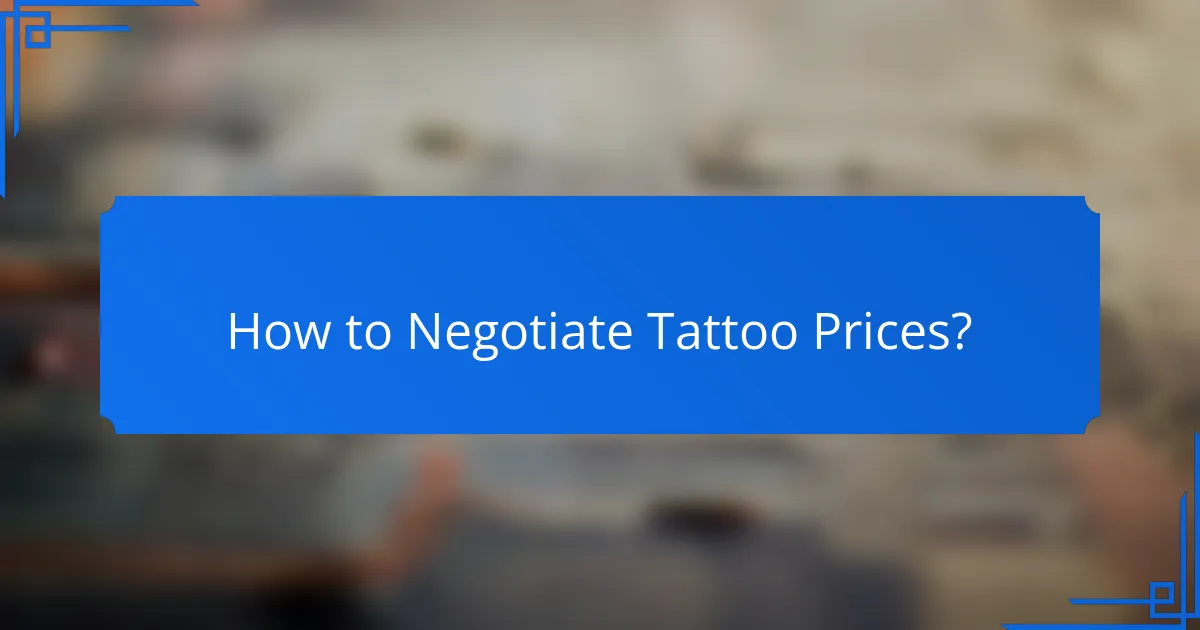
How to Negotiate Tattoo Prices?
Negotiating tattoo prices involves clear communication about your budget and expectations with the artist. Understanding the factors that influence pricing can help you secure a quality tattoo within your financial limits.
Discuss Your Budget Openly
Being upfront about your budget is crucial when negotiating tattoo prices. Artists appreciate honesty, and it allows them to suggest designs or modifications that fit your financial constraints.
Consider providing a range rather than a fixed amount. For example, stating that you can spend between $200 and $300 gives the artist flexibility to work within your limits while still delivering quality.
Don’t be afraid to ask for options that could lower costs, such as smaller designs or less intricate details. Many artists are willing to accommodate budget constraints if they understand your needs clearly.
